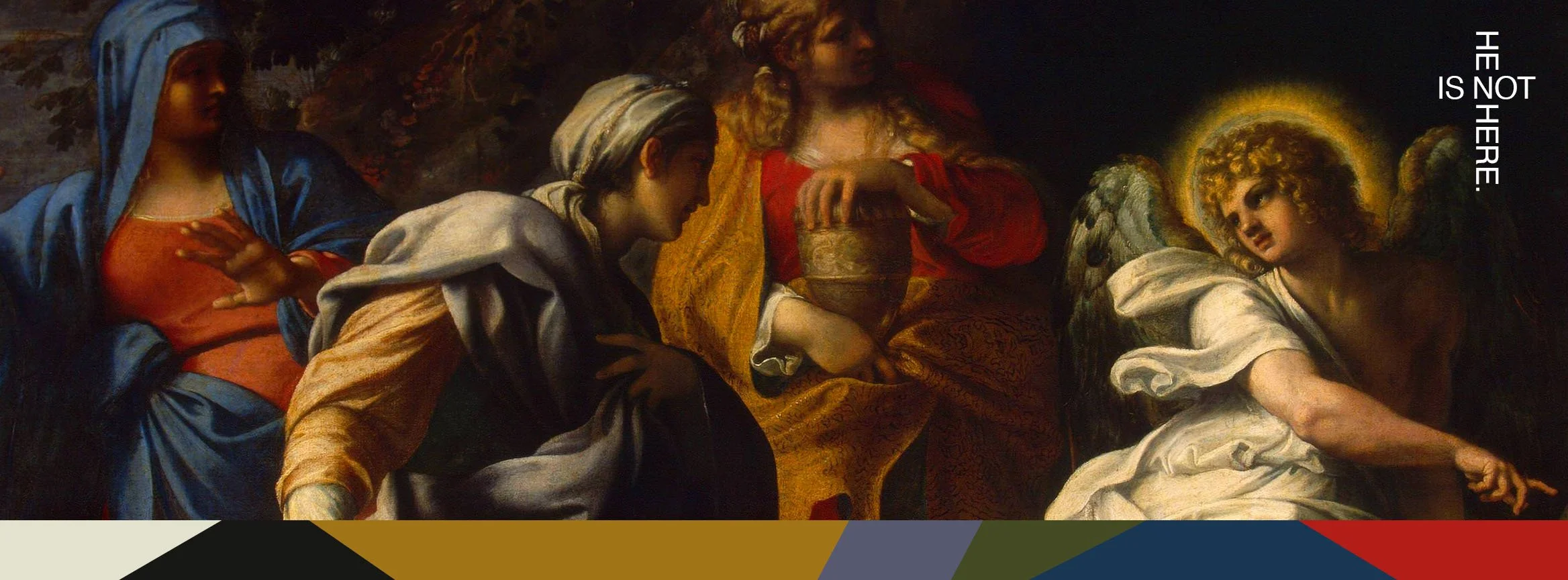EASTER SUNDAY
An Invitation into this Space
Take a moment and be still. Focus on your breath and allow yourself to settle where you are. Accept each breath as the Spirit moves through you. When ready, read this poem and meditate on the artwork provided.
The Box is Open!
Look at the geometry of a box.
That’s where we had God.
That’s where we viewed
Death as an end.
That’s where our interactions with the Divine were
transactional.
But that box has been flattened!
Death couldn’t hold him!
HE IS NOT HERE! He is Risen!
Meditate on the Words of this Scripture
“On the first day of the week, very early in the morning, the women took the spices they had prepared and went to the tomb.
They found the stone rolled away from the tomb, but when they entered, they did not find the body of the Lord Jesus. While they were wondering about this, suddenly two men in clothes that gleamed like lightning stood beside them. In their fright the women bowed down with their faces to the ground, but the men said to them, “Why do you look for the living among the dead?
He is not here; he has risen! Remember how he told you, while he was still with you in Galilee: ‘The Son of Man must be delivered over to the hands of sinners, be crucified and on the third day be raised again.’ ” Then they remembered his words.”
(Luke 24:1-8)
A Reflection
He is Really Not Here
Easter morning marks the triumph of life over death. Yet, this profound revelation came as an absence—an empty tomb. The women who had followed Jesus went where they last saw Him, expecting to find His body. Instead, they were met with a startling message from an angel: "Why do you look for the living among the dead? HE IS NOT HERE; He has risen!" (Luke 24:5-6).
This moment challenges our expectations of how and where we encounter God. The women came to the tomb, but what are tombs? Tombs are places we return to in order to remember someone. Sometimes, we treat church buildings like tombs, culturally sectioning off where God is to be experienced. Like the women, we expect to find Jesus in the last location they saw Him. But often, God moves in a way we couldn't have anticipated. The empty tomb was not a sign of God's absence but rather the greatest evidence of His presence and power.
This encounter demands that we reflect on our own expectations of God. We might find ourselves returning to the "tombs" in our lives—places where God once moved—expecting Him to be there again. But God is not confined to our expectations. He is the God of Resurrection, always moving in ways that transcend our understanding.
Jesus gave us the secret to the resurrection on the cross when He said, "Father, into Your hands I commit My spirit" (Luke 23:46). This act of surrender is echoed later by Paul in Romans, where he writes, "God raised Jesus from the dead" (Romans 10:9). The key to experiencing resurrection—new life—is trusting that God is in control and releasing the illusion of control we think we have. God is the source of all true life and breath. The resurrection teaches us that life comes not from holding on, but from letting go and trusting in God's power to bring life out of death.
So, ask yourself as you reflect: Am I looking for a living God in dead places? Are my expectations of how God should move hindering me from experiencing the resurrection power in my life? The empty tomb reminds us that our limitations do not bind God. He is always doing something new, inviting us to trust Him and let go of our need to control.



